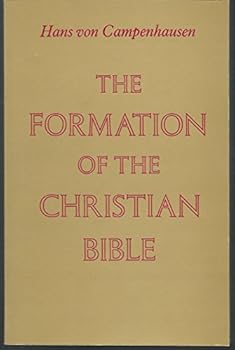Formation of the Christian Bible
No Synopsis Available.
Format:Paperback
Language:English
ISBN:0800612639
ISBN13:9780800612634
Release Date:January 1977
Publisher:Augsburg Fortress Publishers
Length:360 Pages
Weight:1.04 lbs.
Customer Reviews
3 ratings
A rich, wonderful book that will answer all your questions
Published by Thriftbooks.com User , 16 years ago
Although this book is quite scholarly, anyone could pick it up and read it. It may surprise some to realize how disinterested most early Christians were in what would come to be called the New Testament. The reason for this is simple. What was stressed at first was tradition. Paul's "concepts of 'delivering' and 'receiving' ...are not chosen by accident. They...have a ceremonial and technical meaning which describes the special act by which fixed traditions are formally handed on" (p 107). Second Temple Jews stressed rote learning, and there is evidence that their population may have been more literate than the Romans of the time (see Reading and Writing in the Time of Jesus). Oral transmission of religious belief was natural and, apparently, highly trustworthy. This is why the gospels and Paul's epistles, although collected early ( see Martin Hengel) and no doubt read aloud at religious services, were not as highly regarded as the oral traditions and the oral witnesses. Significantly, oral witnesses are mentioned again and again in the gospels and in Paul's epistles. This situation held until about one hundred years after the death of Jesus. It was then that the early church was assailed by both the Marcionites and the gnostics. "According to Irenaeus scripture and tradition...are in entire agreement, and the purpose of scripture is to confirm the teaching of the church against all doubts" (p 182). Although the four gospels and most of what is now known as the New Testament were considered canon by the time of Irenaeus, the canon was not formally set until much later. One of the more fascinating discussions in the book is about typology. I would highly recommend this chapter for anyone interested in learning how the early Christians read the New Testament as well as the Old Testament.
How did the bible come about?
Published by Thriftbooks.com User , 16 years ago
This book, along with Metzger's classic, is very useful for students of the early Christian traditions, or just Christian armchair enthusiasts who are a little curious how their scriptures came about, since we are not Muslim's with a book coming down from heaven, so to speak, nor are we JWs or Mormons with what appears to be an open canon until their so-called prophets came along not too long ago. There were definitive boundaries for what we term the rule, or canon, by the year 200 for sure, as the author demonstrates. He also details that the early church had a particularly "sweeping confidence in oral tradition" and that "the Bible was never regarded as the sole source of Christian faith." This in no way discounts or weakens the revelation of God in Christ Jesus, only places it in the historical context of the life of the Church, not a book. Such a thesis will come as no surprise to Roman Catholics or Eastern Orthodox, or even some historically-minded Protestants (of which the author was a leading exponent from the Lutheran tradition in Germany). So it's true that the Church came before the NT, but not before the events recorded in the Gospels (obviously, I hope), so in this way the authority of the scriptures is normative and absolute. Even so, there was a process of canonical determination based upon oral tradition that resonated exactly with the written accounts (form which they were produced), and it would be a little too simplistic to maintain that the outcome was "a given". There was a debate. Of course they (we) believe that the Holy Spirit guided them in this process, but our faith should not be based upon fairy tales like sola scriptura of the type that says everything we need to believe is clearly expounded in the bible. It just isn't like that. If God had intended the bible alone to be the rule of faith, outside of the Tradition that produced it, then we can be left wondering why it is not clearer on central issues like baptism, worship, eucharist, ministry among many others. If you doubt this, just put a Baptist, a Lutheran and a Methodist in a room together with their bibles. They will disagree on these central aspects, or one will become non-denominational and say that these are only superficial differences and let's all love Jesus. But which Jesus? It wasn't solved by sola scriptura in the fourth century. It was the tradition, of which scripture is central. The bible has a context and that context is the worshipping community of the Church, expounded upon by the episcopacy (here Campenhausen disagrees, claiming an egalitarian exegetical authority. But I would argue that this is true only to the extent that one reads/prays the scripture with the mind of the worshipping community.) If you are looking for a letter by letter introduction, use Metzger, but if you are looking for a detailed overview that explains the theological context of the canon in a more sitz im leben approach, I would find this very useful. Other books of i
A well-written book
Published by Thriftbooks.com User , 23 years ago
I read this book for Undergrad studies on the early Christian Church. I found it to be extrememly well-documented and very thorough. It can be a bit much for someone who is not familiar with thought at the time. It does not document the acutal books in the Canon, but what thought processes surrounded the formation. It delves into Marcion's early canon and the resulting backlash of the orthodox world.I recommend this book to those who are very interested in the early Christian Church and thoughts at the time. Be prepared to read Greek and Latin fluently.






